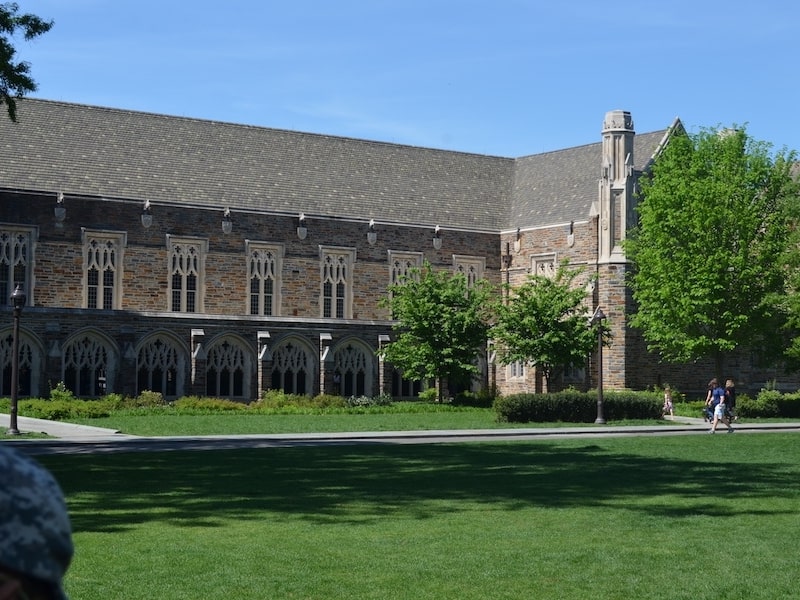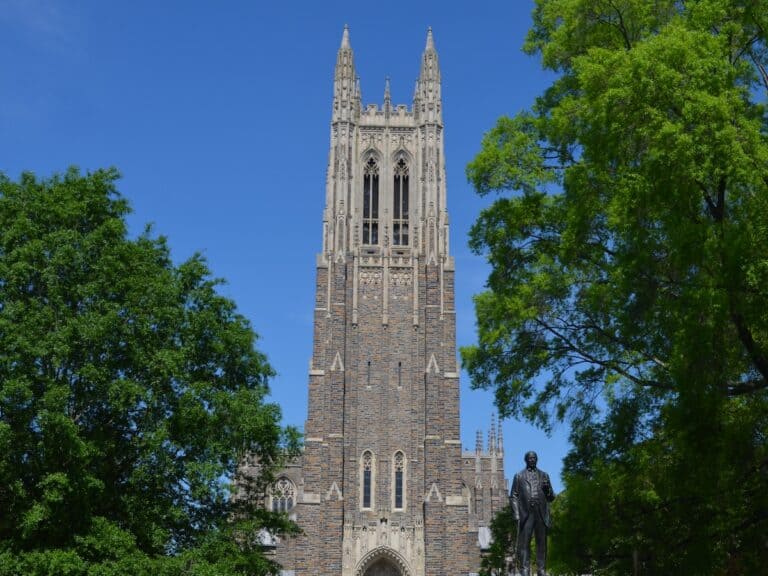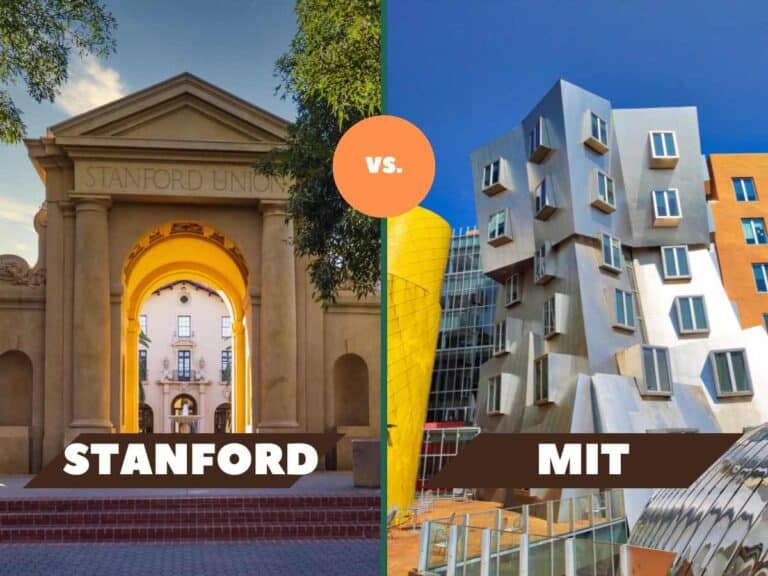Duke vs. Vanderbilt: Which One is Best Fit For You
Many college-bound high schoolers steer clear of Duke University and Vanderbilt University because they are ridiculously selective. But not you — you are very confident that you have what it takes to earn a degree from either of them. Because of this, you want to know which between Duke and Vanderbilt is right for you.
Both Duke and Vanderbilt Universities have high college rankings, low acceptance rates, and Ivy League-like statuses. The major difference is where they are located. Students who want to spend the next 4 years in a city may prefer Vanderbilt. Students who prefer a suburban environment will like Duke more.
Wondering which of these two elite schools you should include on your college list? Read on.
Below, we will compare Duke University and Vanderbilt University. While they are alike in various ways, there are a few things that set them apart from one another. And that is why by the time you get to the concluding part of this article, you will have a much better idea of which of the two is the perfect fit for you.

Are Duke and Vanderbilt Ivy League Schools?
Duke University and Vanderbilt University are not Ivy League schools. Despite this, they are just as prestigious and selective as the eight institutions that make up the elite group of Northeast schools. As a matter of fact, both Duke and Vanderbilt are considered Hidden Ivies and Southern Ivies.
It’s no secret that only a very small fraction of applicants get accepted into the Ivy Leagues.
This is one of the reasons why Duke University and Vanderbilt University are often mistaken as Ivy League schools — they have some of the lowest acceptance rates on the land. In a few, we will talk about which of the two is harder to get into, so don’t stop reading now if you cannot decide whether it’s Duke or Vanderbilt you should add to your college list.
But there are many other things to consider when building a college list. To help you get started with the task, here’s a quick comparison of these two Southern institutions:
| DUKE UNIVERSITY | VANDERBILT UNIVERSITY | |
|---|---|---|
| Location | Durham, North Carolina | Nashville, Tennessee |
| Campus size | 8,600 acres | 333 acres |
| Campus type | Suburban | Urban |
| Founding year | 1838 | 1873 |
| School type | Private research university | Private research university |
| Number of majors | 53 | 74 |
| Selectivity level | Highly selective | Highly selective |
| Retention rate | 98% | 97% |
| Graduation rate | 95% | 92% |
| Number of students | 16,766 | 13,537 |
| Average class size | <20 students in most classes | <20 students in most classes |
| Student-to-faculty ratio | 6:01 | 8:01 |
| Color | Duke blue and white | Black and gold |
| Mascot | The Blue Devil | Mr. Commodore or Mr. C |
| Number of varsity teams | 27 | 16 |
| Athletic affiliation | NCAA Division I | NCAA Division I |
What is the Ranking of Duke and Vanderbilt?
Duke University is #9 in National Universities by US News. On the other hand, Vanderbilt University is #14 in the same category by the same college ranking site. Vanderbilt is #13 in Top Private Universities in America by Niche. Meanwhile, Duke is #6 in the same category by the same college ranker.
Most college rankings are dominated by the Ivy Leagues. Since both Duke University and Vanderbilt University are elite schools, it isn’t surprising why they tend to rank high, too, across various categories and ranking sites.
Letting college rankers tell you which colleges and universities to apply to is wrong.
However, there is nothing wrong with seeking their help each time you are torn between two schools that share a factor you find very important in the college selection process. For instance, if there is only one spot remaining on your college list and you have a couple of options, a college ranking site may be able to help you make up your mind.
The following are some other Duke University rankings by different college ranking sites:
- #1 in Best Christian Colleges in America (Niche)
- #1 in Best Colleges in North Carolina (Niche)
- #1 in the South (Forbes)
- #12 in Most Liberal Colleges in North Carolina (Niche)
- #12 in Research Universities (Forbes)
- #13 in Best Undergraduate Teaching (US News)
- #13 in Best Value Schools (US News)
- #44 in Best College Campuses in America (Niche)
Related Article: Is Duke as Good As an Ivy League?
And now, here are a few other rankings of Vanderbilt University by various college rankers:
- #1 in Best Colleges in Tennessee (Niche)
- #2 in the South (Forbes)
- #3 in Most Liberal Colleges in Tennessee (Niche)
- #8 in Best Value Schools (US News)
- #10 in Colleges With the Best Professors in America (Niche)
- #12 in Best Undergraduate Teaching (US News)
- #14 in Research Universities (Forbes)
- #39 in First-Year Experiences (US News)
Related Article: Is Vanderbilt a Good School?
Again, keep in mind that you should not choose an institution for higher education based on college rankings alone.
While checking out college ranking sites can help you get to know schools even more, especially those that have some things in common such as the type of institution, campus setting and tuition cost, make sure that you decide according to factors that you, not a popular college ranker, find personally important.

Which is Harder to Get Into: Duke or Vanderbilt?
Both Duke University and Vanderbilt University are harder to get into than most US colleges and universities. Duke has an acceptance rate of 7.6%. On the other hand, Vanderbilt has an acceptance rate of 9.1%. Because of their selectivity level, applying to them is like applying to the Ivy Leagues.
For many students, Duke University and Vanderbilt University are mere reach schools. It’s due to the fact that these top-notch institutions accept only applicants whose academic qualifications are above average.
As a matter of fact, Duke is the hardest institution in North Carolina to get into.
Similarly, in all the schools in Tennessee, Vanderbilt is the hardest to get into. Needless to say, if it’s an acceptance letter that you want, your high school grades and the rest of your application should be able to impress the admissions officers at these prime institutions.
Duke University and Vanderbilt University are so selective that their acceptance rates are lower than the acceptance rates of some of the Ivy League schools. Just take a look at this table:
| IVY LEAGUE COLLEGE | ACCEPTANCE RATE |
| Harvard University | 4.50% |
| Columbia University | 5.10% |
| Princeton University | 5.80% |
| Yale University | 5.90% |
| Brown University | 6.30% |
| University of Pennsylvania | 7.40% |
| Dartmouth College | 7.90% |
| Cornell University | 10.60% |
Related Article: What Are The Best Non-Ivy League Schools Along The East Coast?
Early Decision at Duke and Vanderbilt
Duke University offers Early Decision. Vanderbilt University offers Early Decision, too. However, the institution has both Early Decision I and Early Decision II. It’s important to note that Early Decision is binding, which means an acceptance requires withdrawal of applications from other schools.
Certain that you will enroll at either Duke or Vanderbilt if an acceptance letter is sent your way? Then you may consider filling out the Common App or Coalition App and submitting it earlier than your classmates.
Both Duke University and Vanderbilt University allow college-bound teens to apply to them without delay. This is most especially true if these institutions are their absolute top choice, as evidenced by their names appearing at the top of their respective college list. Applying Early Decision may increase their chances of getting accepted, too!
To make sure you won’t miss any deadline, here are the important Duke application dates:
| DECISION PLAN | DEADLINE | DECISION NOTIFICATION |
| Early Decision | 1-Nov | Mid-December |
| Regular Decision | 4-Jan | Late March to Early April |
Meanwhile, the deadlines for various decision plans Vanderbilt offers are as follow:
| DECISION PLAN | DEADLINE | DECISION NOTIFICATION |
| Early Decision I | 1-Nov | Mid-December |
| Early Decision II | 1-Jan | Mid-February |
| Regular Decision | 1-Jan | Late March |
Earlier, we talked about the fact that both Duke University and Vanderbilt University have very low acceptance rates, which makes them similar to the Ivy Leagues but without being a part of the high-status group.
Applying ahead of everyone else is a way to increase your admissions chances.
For instance, Duke’s 7.6% acceptance rate jumps to 16.7% for those who apply to the Durham, North Carolina-based school Early Decision. Meanwhile, the 9.1% acceptance rate at Vanderbilt increases to 18.1% for those who apply earlier than everybody else via Early Decision I or Early Decision II.
Keep in mind that Early Decision is binding. This means that you will have to go to Duke University or Vanderbilt University if it accepts you. So, in other words, apply Early Decision to either one because it’s your top choice.

Academic Factors That Duke and Vanderbilt Use in Admissions
Duke University and Vanderbilt University consider various factors in the admissions process. All academic factors are very important for Duke’s admissions officers, except for class rank. The same is true for the admissions officers at Vanderbilt, although recommendations are not as important.
Many students use a college chances calculator to have an idea of whether or not it is likely for them to get accepted into the institutions for higher education they are thinking about including on their college lists.
Knowing which admissions factors a college or university uses when evaluating applicants is a must. This can help make it easier for any student to decide if applying to a school is either a smart move or a complete waste of application fees. Different schools tend to use different factors in coming up with admissions decisions.
These are the academic factors in the admissions process at Duke University and their relative importance:
- Academic rigor – very important
- GPA – very important
- Standardized test score – very important
- Admissions essay – very important
- Recommendations – very important
Class rank, as mentioned earlier, is not one of the academic factors that Duke takes into account.
It’s a different story when it comes to non-academic factors. That’s because the private research university in the Tar Heel State considers every single one of them, although at varying levels of importance. Extracurricular activities, personal qualities and talent are all “very important” non-academic factors.
The following non-academic factors have a relative importance of “considered”:
- Interview
- First generation
- Alumni member relation
- Geographical residence
- State residency
- Religious affiliation
- Race or ethnicity
- Volunteer work
- Work experience
- Demonstrated interest
Meanwhile, here are Vanderbilt’s academic factors in the admissions process and each one’s relative importance:
- Academic rigor – very important
- Class rank – very important
- GPA – very important
- Standardized test score – very important
- Admissions essay – very important
- Recommendations – important
As you can see, unlike Duke University, class rank is an academic factor that’s taken into account by the admissions officers at Vanderbilt University. However, they are not as critical with the recommendation letters.
Only two non-academic factors have a relative importance of “very important” in the admissions process at Vanderbilt. They are extracurricular activities and personal qualities. An applicant’s talent is under the “important” group.
On the other hand, the following non-academic factors have a relative importance of “considered”:
- Interview
- First generation
- Alumni member relation
- Geographical residence
- State residency
- Race or ethnicity
- Volunteer work
- Work experience
Vanderbilt University does not consider both religious affiliation and demonstrated interest.

How Much Does It Cost to Go to Duke and Vanderbilt?
For the academic year 2021 to 2022, the estimated cost of attending Duke University amounts to $81,488. The tuition and fees alone cost $60,594. For the same academic year, on the other hand, the estimated cost of going to Vanderbilt University amounts to $79,538. The tuition and fees cost $56,966.
Duke and Vanderbilt are equally great schools. However, the cost of attendance at one is slightly cheaper than the other. And because both are private institutions, there are no separate in-state and out-of-state tuition costs.
Among all North Carolina institutions, Duke University is the most expensive. It is followed by Wake Forest University, Davidson College and Meredith College.
Similarly, Vanderbilt University is the most expensive school in Tennessee. Following it are Rhodes College, Sewanee: The University of the South and Maryville College.
Here’s a breakdown of the estimated cost of attendance at Duke for the academic year 2021 to 2022:
| EXPENSES | COST |
| Tuition and Fees | $60,594 |
| Room and board | $17,484 |
| Books, supplies, etc. | $3,410 |
| TOTAL | $81,488 |
According to Duke University itself, up to 52% of its undergraduate students are receiving some form of aid. This means that a little over half of its student body does not pay the full cost of attending the Ivy League-like institution. What’s more, the school emphasizes that it is able to meet 100% of demonstrated financial need.
And now, the following is a breakdown of the estimated cost of going to Vanderbilt for the same academic year:
| EXPENSES | COST |
| Tuition and fees | $56,966 |
| Room and board | $18,376 |
| Books, supplies, etc. | $4,196 |
| TOTAL | $79,538 |
Vanderbilt University says that over 60% of its students are getting some type of aid.
And just like Duke University, the institution in the Volunteer State is able to meet 100% of demonstrated financial need. It offers a full range of merit-based scholarships, need-based financial assistance and financing options to families of all income levels.
By the way, Vanderbilt’s admissions process is need-blind, which means that it accepts all qualified students regardless of their economic circumstances.
Do Duke and Vanderbilt Require Test Scores?
As of this writing, both Duke University and Vanderbilt University have a test-optional policy. This means that SAT and ACT scores are not required. However, applicants may choose to submit their standardized test scores. Any submitted SAT and ACT scores will be considered in the admissions process.
Earlier, we established the fact that standardized test scores are very important academic factors in the admissions process at Duke and Vanderbilt. But since these schools are currently test-optional, just like many colleges and universities in the US, SAT and ACT scores will not be considered — unless applicants choose to submit them.
It’s completely up to you to decide whether or not you will disclose your standardized test score.
Choosing not to submit your SAT or ACT score will not put you at a disadvantage in the admissions process. In addition, Duke University and Vanderbilt University will not ask for your reason behind it.
Very happy with your standardized test score?
Consider submitting it anyway. Despite having a test-optional policy, 53% of students admitted to Duke submitted their SAT scores. On the other hand, 72% submitted their ACT scores.
At Vanderbilt, 43% of accepted students submitted their SAT scores. Meanwhile, 64% submitted their ACT scores.
To give you an idea of whether or not your standardized test score could increase your admissions chances, check out this table showing the range of SAT and ACT scores of applicants admitted into Duke and Vanderbilt:
| SAT SCORES | ACT SCORES | |
| Duke University | 1480 to 1570 | 33 to 35 |
| Vanderbilt University | 1460 to 1560 | 33 to 35 |
Applicants who receive an offer from Duke usually have higher SAT scores than applicants who are admitted into Vanderbilt. But when it comes to ACT scores, it’s apparent that both schools have a penchant for the same composite scores.
Conclusion
Above, we discussed an assortment of admissions-related things about Duke University and Vanderbilt University — from their acceptance rates, cost of attendance to academic and non-academic factors considered in the admissions process. And in doing so, we got to know why these institutions are often mistaken as Ivy League schools.
Now that you know Duke and Vanderbilt a little more and are aware of the things that make them similar as well as those that set them apart, you can decide so much better which one of them you should consider applying to.
Disclaimer: The views and opinions expressed in this article are those of the authors and do not necessarily represent those of the College Reality Check.





